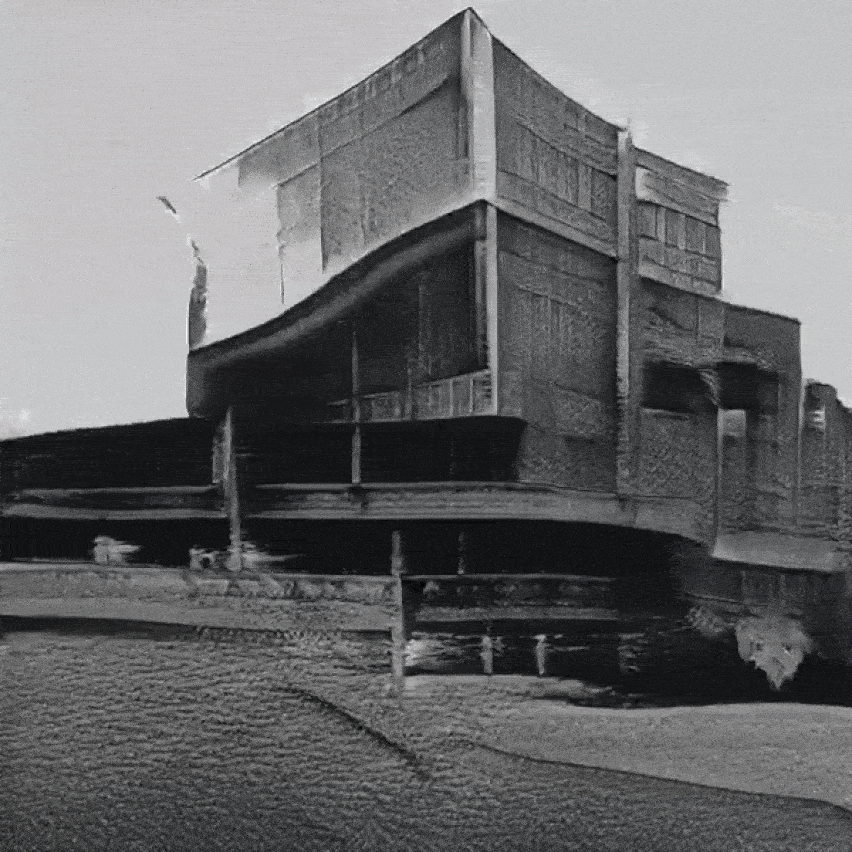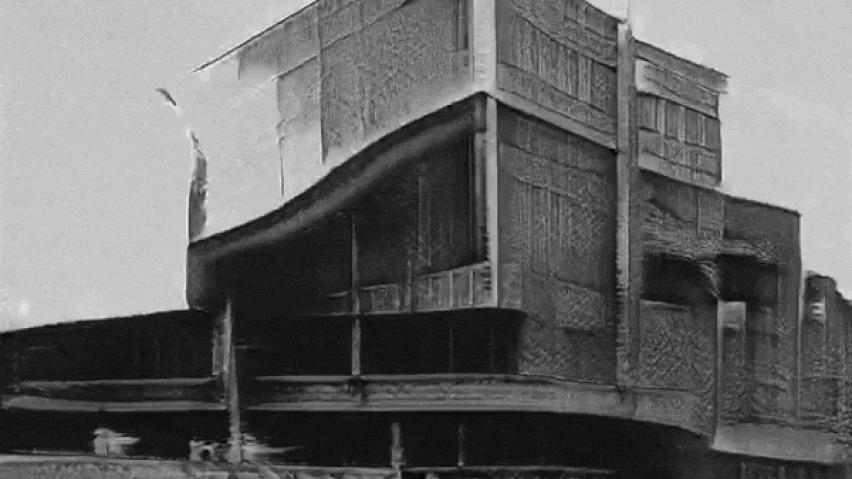
Lisbon DJ Moullinex has shared an exclusive short music video showing an endlessly changing landscape of brutalist buildings drawn up by a generative design algorithm with Dezeen.
Moullinex, whose real name is Luís Clara Gomes, created two videos that use artificial intelligence (AI) to imagine a series of brutalist buildings.
The first video, which the artist shared on his Facebook page, is based on 200 photographs of modernist, concrete buildings including Le Corbusier's High Court in Chandigarh, the São Paulo Museum of Art by Lina Bo Bardi and Ole Scheeren's The Interlace.
These images acted as the dataset, which was used to train a generative network via the machine learning tool StyleGAN2, to create a string of entirely non-existent buildings with similar characteristics.

"It's akin to showing thousands of pictures of a cat to a child and then asking them to draw a brand new cat based on what they now know are cat-like characteristics," Gomes told Dezeen.
"The more cats you see, the more realistic cats you can imagine," he continued. "A particularity of these networks is that you can 'walk' the latent space between two images. So the results are often striking, as the transitions are organic and seamless."
This allows the buildings to morph fluidly into one another, as they flit across the screen to an electronic beat that Gomes scored especially for the short clip.
The second video, called Brutal Nature, has been shared exclusively with Dezeen and is based on images of brutalist buildings that integrate plant life into their architecture.
The Brutal Nature video is underscored by a remix of Moullinex's song Ven
"The structure and materials of these buildings are exposed. They represent an emotionless, naked truth," said Gomes.
"Anything remotely emotional you juxtapose with them becomes much more emotional, such is the contrast. I love how the starkness of the concrete is offset against the organic, vibrant shapes of plants.
"I also find parallels with brutalism in my music, as I tend to gravitate towards the contrast of bare, electronic soundscapes with emotional elements such as vocals and other organic instruments."
Underscoring the video is a remix of Moullinex's single Ven, which is set to be released later this week.
At this stage, both videos are prototypes, allowing Gomes to assess the feasibility of having an entire, full-length music video be generated by AI.
"It's the intersection of technology and emotion I am truly interested in," he said.
"Electronic soundscapes are artificial by nature but we can humanise them by using them within the framework of a language we speak, such as music. Same for visual data, where these tools can be charged with the emotional meaning we want, by curating the input data and control parameters."
Last month, Google affiliate Sidewalk Labs released a software, which uses machine learning to draw up millions of possible configurations for urban developments in a matter of minutes.
Similarly, Wallgren Arkitekter and BOX Bygg, as well as US researcher Joel Simon, have independently developed parametric tools that optimise floor plans based on the particular spatial constraints of a given site.
In response, designer Sebastian Errazuriz has argued that 90 per cent of architects will lose their jobs to artificial intelligence because "it's almost impossible for you to compete".
But Gomes maintains that, when working with machine learning, the role of the creator simply changes rather than becoming completely obsolete.
"As an artist, you become more of a curator of source materials and concepts and the technology is the 'oven' where the piece is cooked," he said.
"The oven is an apt metaphor as these experiments require a huge computational time and results are often unexpected. You can control the clay and the temperature but then you have to wait to see the results. There's beauty in patiently waiting."
The post AI-generated brutalist buildings feature in hypnotic Moullinex music videos appeared first on Dezeen.
from Dezeen https://ift.tt/3nxyUzu
No comments:
Post a Comment